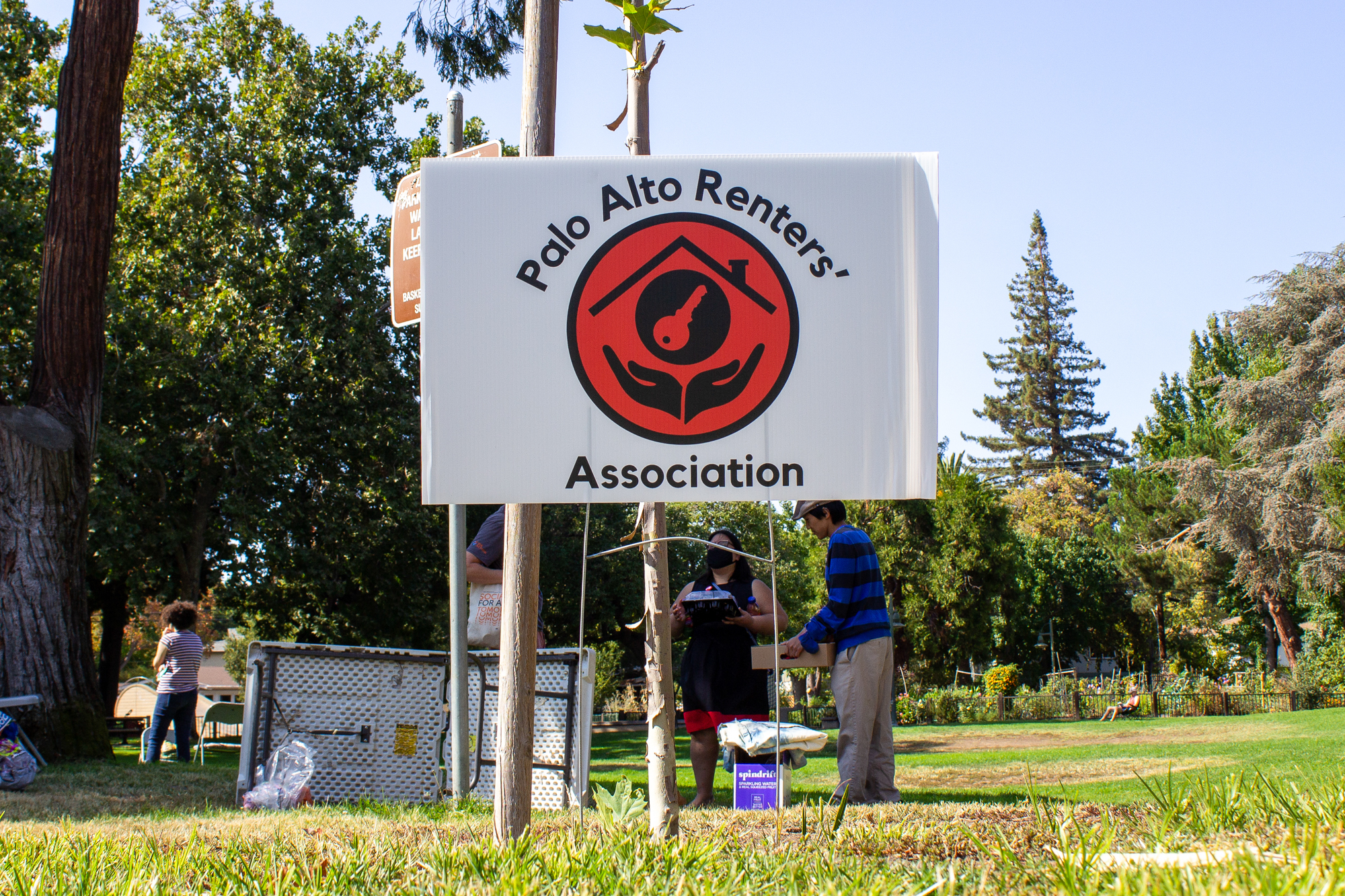Palo Alto Renters' Association, a nonprofit that formed in 2020 to advocate for local tenants, will soon be no more.
Citing its recent accomplishments and its ongoing fundraising and operational challenges, the organization is preparing for dissolution, its leaders announced last week. Rather than operate as a separate entity, Palo Alto Renters' Association will be absorbed into Palo Alto Forward, a nonprofit that has been serving as its fiscal sponsor over the past three years.
"This will allow shared resources, preventing both of us from working in siloed ways that faction our movement and make it harder to work together," Angie Evans, co-founder of Palo Alto Renters' Association, wrote in a public statement on the nonprofit's homepage.
The nonprofit is dissolving at a time when tenant protections are becoming an increasingly urgent topic for the City Council. Since last year, the council had revised local laws to make sure more tenants are eligible for relocation assistance; to establish a cap on security deposits; and to firm up rules governing "just cause" evictions. This week, the council advanced its top priority on the topic: the establishment of a rental registry. The program is set to roll out next summer, according to planning staff.
In an interview, Evans pointed at the group's success in advocating for these issues and noted that, with the registry advancing, the Palo Alto Renters' Association has met most of its goals. The one glaring exception is increasing the city's housing supply, an objective that Palo Alto Renter's Association shares with Palo Alto Forward, a local nonprofit that has been lobbying for zoning reforms and new housing developments for the past decade.
Now the latter group is poised to subsume the former. Leaders of both nonprofits told this publication in interviews that their organizations agreed to form the new arrangement in recent months, a transition that coincided with the departure of Lauren Bigelow, who helped establish the renters' group and who assisted the City Council in formulating a plan for adopting new tenant protection policies.
Evans said a key consideration for Palo Alto Renters' Association was determining the best way to use its limited staffing and resources to achieve maximum impact. Rather than building its own fundraising operation, the renters group decided to join Palo Alto Forward. In the coming days, the renters group plans to shut down its website and direct people to the new tenant page on the Palo Alto Forward site, she said.
"This entity isn't going to exist as a body that is advocating just for tenants by tenants," Evans said in an interview.
Some things, however, will fall by the wayside during the transition. Even though both Palo Alto Renters' Association and Palo Alto Forward advocate for more housing, their missions aren't identical. The renters group famously focused on the 47% of Palo Alto's population that is made up of tenants. Palo Alto Forward, by contrast, advocates for all types of housing and has been active in the city's prolonged effort to win state approval for its new Housing Element. While the missions of the two nonprofits may be aligned most of the time, there may be topics (say, rent control?) on which housing advocates could reasonably disagree. Once the transition is completed, tenants will no longer have a nonprofit to call their own.
There's also the issue of tenant counseling. Since its establishment in 2020, Palo Alto Renters' Association has been assisting Palo Alto tenants who faced steep rent hikes or eviction proceedings. Some of these tenants became key advocates. When the council was advancing a policy last year to expand the types of housing developments that qualify for eviction protections, the renters group introduced council members to tenants who had just faced eviction and who would have benefitted from such a policy had it been enacted earlier, Evans said.
"It was really powerful to be able to connect tenants directly to council members," Evans said.
Under the new setup, the tenant counseling services will end. Palo Alto Forward recently created a dedicated page listing the resources that are available to tenants, including mediation services and a link to the city's wait list for below-market-rate housing. It will not, however, be directly involved in counseling tenants through their specific predicaments, Evans said. While Palo Alto Forward has been deeply involved in vetting the city's housing plans, Evans noted that it has neither the expertise nor the capacity to directly provide tenant assistance.
Amie Ashton, executive director of Palo Alto Forward, shared this view and confirmed that direct counseling to renters will not be provided. But despite this drawback, Ashton said her group is excited to welcome members of the renters' group into its fold. The two groups, she noted, have consistently supported each other's efforts when it comes to lobbying for more housing. She also noted, however, that Palo Alto Forward is not equipped to directly assist tenants with legal counseling.
Ashton acknowledged that some housing issues will elicit a variety of opinions.
"There are hardline folks on both sides of the rent and ownership spectrum who want different things, so it's just a point of walking the midline and bringing everyone into the movement while not alienating folks," Ashton said.
To make sure that tenants' rights doesn't fade away as an issue of concern, the group may establish a subcommittee to focus on issues specific to renters, Ashton said. Having strong tenant advocates in the group will be particularly critical in the months and years ahead, as Palo Alto moves ahead with implementing its Housing Element.
"There are tenant protection policies in the Housing Element that will need to be watchdogged," Ashton said.
Ashton said she plans to meet members of Palo Alto Renters' Association in the coming weeks to get their feedback about the new organizational structure. Both she and Evans expressed hope that the new partnership will help members of both groups effectively advocate for their overlapping priority: making Palo Alto a more affordable place to live.
"Because there are so few homes, a handful of landlords get to make up the rules and we want tenants to have an opportunity to weigh in on the policies around new housing, implementation of our Housing Element, and local land use and zoning," Evans wrote in a public letter announcing the transition.




Comments
Registered user
Mayfield
on Nov 29, 2023 at 11:04 am
Registered user
on Nov 29, 2023 at 11:04 am
Until the City establishes a real bonafide supportive housing and development department, resident renters/workers will lose out and so will our City Hall. When in 2014 Mountain View established an actual city renter housing wait list and administered by city staff, MV immediately embraced the housing crisis. In the meantime, it up to volunteers and other 501c3's locally here in PA that cushion blow after blow to trying to work and survive as a renter. Low wage workers who rent here are the lowest rung on our city's priority list. Palo Alto home owners and property moguls push down those who rent.
It will remain an imbalance of power until more of our council members are representative of the 47% of those who rent here. Renters and the children of renters, are viewed as temporary residents, non taxed quasi stake holders -- as well renters a many are working overtime to make the highest rents and live in fear of evictions for small infractions and a massive private property sell off. Sadly the city does not view renters as investors in volunteerism, employed & attend in our schools & Stanford, work at our libraries, as economic investors in local commerce and sales. Sadly our economy is falling apart as 80% of resident residents renters or owners are spending our hard earned dollars in MV, RWC, LA, MP where goods are more plentiful and cheaper! Doubly unless one has an owned property in this zip that brings in taxed property revenue -- everyone and anything else is considered 2nd class. I hear this in various forms from the Dais whether it is CC or PTC or Parks, history or architectual resource.... where 99% of those serving from these positions are single family homeowners, invested in the course of the future for themselves, alone. Unless the renter is fairly represented too on these boards, commissions and councils change will remain slow as taffy.
Registered user
Evergreen Park
on Nov 29, 2023 at 9:07 pm
Registered user
on Nov 29, 2023 at 9:07 pm
I’m sorry to see the Palo Alto Renter’s Association dissolve. Lauren Bigelow did a really nice job of gathering data about the renters in Palo Alto. I don’t support Palo Alto Forward, which has mostly supported big housing projects in our city, even though most of them provide mostly market rate housing. As a long-term renter, I don’t see how I or other low-income people could afford to live in these places. Thanks a lot, Lauren, for your attempt to help low-income Palo Alto renters.